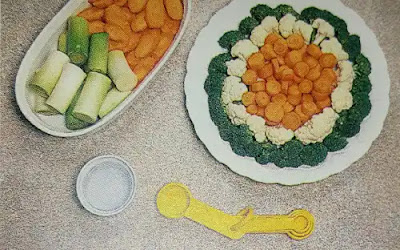Microwave Basic Guidelines for Cooking Fresh Vegetables
Old root vegetables such as carrots, swede, and parsnip should
be cut into slices or strips. Small young vegetables can be cooked whole.
Shred cabbage or cut into wedges. Leeks can be cooked whole. If they are to be cooked with other vegetables it is best to cut them into 5
cm ( 2 inches) lengths or into slices.
Vegetables that have a similar cooking time can
be cooked together. Ideal combinations are sprouts, cauliflower florets,
carrots, broccoli, leek, and green beans. When cooking a combination of
vegetables they can be cooked in the same dish as the flavours will not
transfer.
Potatoes should be cooked on their own, however, if you are
cooking swede, parsnip, or turnips you can cook these with the potatoes.
Do not mix fresh and frozen vegetables. Do not mix items
that need long cooking times, with those that need shorter times e.g. Do not
mix potatoes and peas ( the peas would be overcooked in the time needed for
the potatoes to cook . )
Fresh vegetables need 4 x 15 ml ( 4 tbsp ) water for up to
450 g ( 1 lb ). For each extra 450 g ( 1 lb ) allow an additional 2 x
15 ml ( 2 tbsp ) water. This will create enough steam to cook the vegetables.
NEVER salt vegetables. Salt draws the natural moisture out
of the food and can cause them to dehydrate and burn ( seen as brown speckles, especially on cauliflower ). As you cook in reduced amounts of liquid
you do not need the amount of salt you would use conventionally. It is better
to add salt to the table.
As you get used to microwave cooking you will
appreciate how little salt is needed, you can then add a little ( a pinch is
plenty ) to the cooking water, dissolve it, then sprinkle the water over the
vegetables.
Always put the vegetables in a dish that is a suitable size. There should be about 3.5 cm ( 1½ inch ) headroom at the most. Use flat-based dishes rather than basins.
Always cover vegetables either with a lid
that fits the dish or with cling film. At the end of cooking loosen the cling
film and leave the vegetables to stand for 5 minutes.
Also Read: Microwave Savoury Rice Recipe










